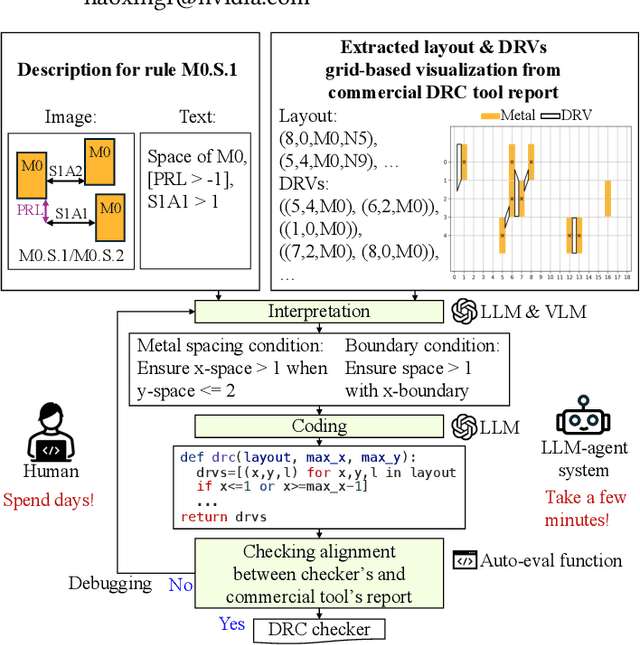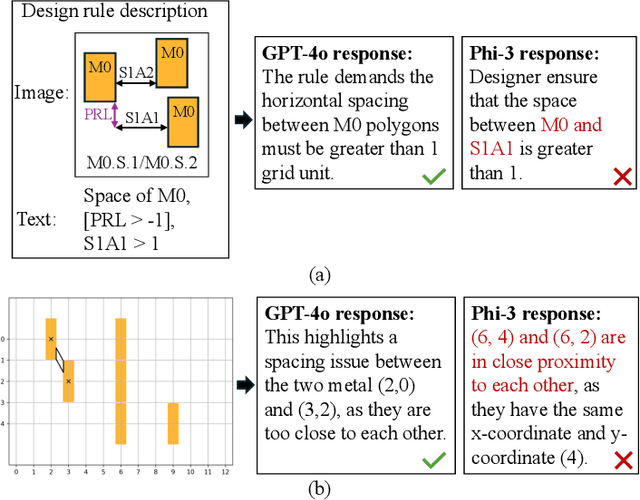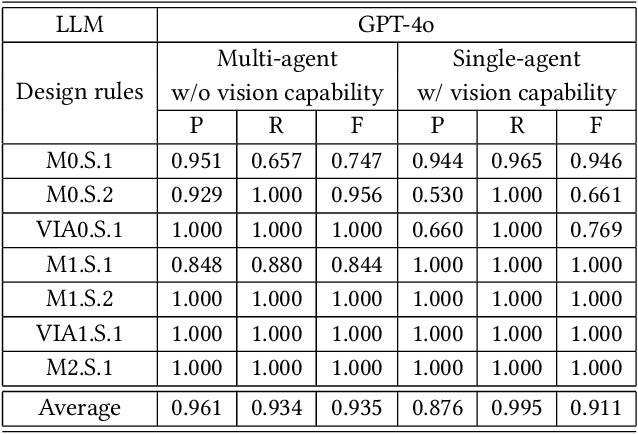Chia-Tung Ho
GRPO with State Mutations: Improving LLM-Based Hardware Test Plan Generation
Jan 12, 2026Abstract:RTL design often relies heavily on ad-hoc testbench creation early in the design cycle. While large language models (LLMs) show promise for RTL code generation, their ability to reason about hardware specifications and generate targeted test plans remains largely unexplored. We present the first systematic study of LLM reasoning capabilities for RTL verification stimuli generation, establishing a two-stage framework that decomposes test plan generation from testbench execution. Our benchmark reveals that state-of-the-art models, including DeepSeek-R1 and Claude-4.0-Sonnet, achieve only 15.7-21.7% success rates on generating stimuli that pass golden RTL designs. To improve LLM generated stimuli, we develop a comprehensive training methodology combining supervised fine-tuning with a novel reinforcement learning approach, GRPO with State Mutation (GRPO-SMu), which enhances exploration by varying input mutations. Our approach leverages a tree-based branching mutation strategy to construct training data comprising equivalent and mutated trees, moving beyond linear mutation approaches to provide rich learning signals. Training on this curated dataset, our 7B parameter model achieves a 33.3% golden test pass rate and a 13.9% mutation detection rate, representing a 17.6% absolute improvement over baseline and outperforming much larger general-purpose models. These results demonstrate that specialized training methodologies can significantly enhance LLM reasoning capabilities for hardware verification tasks, establishing a foundation for automated sub-unit testing in semiconductor design workflows.
Autonomous Code Evolution Meets NP-Completeness
Sep 09, 2025Abstract:Large language models (LLMs) have recently shown strong coding abilities, enabling not only static code generation but also iterative code self-evolving through agentic frameworks. Recently, AlphaEvolve \cite{novikov2025alphaevolve} demonstrated that LLM-based coding agents can autonomously improve algorithms and surpass human experts, with scopes limited to isolated kernels spanning hundreds of lines of code. Inspired by AlphaEvolve, we present SATLUTION, the first framework to extend LLM-based code evolution to the full repository scale, encompassing hundreds of files and tens of thousands of lines of C/C++ code. Targeting Boolean Satisfiability (SAT), the canonical NP-complete problem and a cornerstone of both theory and applications. SATLUTION orchestrates LLM agents to directly evolve solver repositories under strict correctness guarantees and distributed runtime feedback, while simultaneously self-evolving its own evolution policies and rules. Starting from SAT Competition 2024 codebases and benchmark, SATLUTION evolved solvers that decisively outperformed the human-designed winners of the SAT Competition 2025, and also surpassed both 2024 and 2025 champions on the 2024 benchmarks.
PRO-V: An Efficient Program Generation Multi-Agent System for Automatic RTL Verification
Jun 13, 2025Abstract:LLM-assisted hardware verification is gaining substantial attention due to its potential to significantly reduce the cost and effort of crafting effective testbenches. It also serves as a critical enabler for LLM-aided end-to-end hardware language design. However, existing current LLMs often struggle with Register Transfer Level (RTL) code generation, resulting in testbenches that exhibit functional errors in Hardware Description Languages (HDL) logic. Motivated by the strong performance of LLMs in Python code generation under inference-time sampling strategies, and their promising capabilities as judge agents, we propose PRO-V a fully program generation multi-agent system for robust RTL verification. Pro-V incorporates an efficient best-of-n iterative sampling strategy to enhance the correctness of generated testbenches. Moreover, it introduces an LLM-as-a-judge aid validation framework featuring an automated prompt generation pipeline. By converting rule-based static analysis from the compiler into natural language through in-context learning, this pipeline enables LLMs to assist the compiler in determining whether verification failures stem from errors in the RTL design or the testbench. PRO-V attains a verification accuracy of 87.17% on golden RTL implementations and 76.28% on RTL mutants. Our code is open-sourced at https://github.com/stable-lab/Pro-V.
Timing Analysis Agent: Autonomous Multi-Corner Multi-Mode (MCMM) Timing Debugging with Timing Debug Relation Graph
Apr 15, 2025Abstract:Timing analysis is an essential and demanding verification method for Very Large Scale Integrated (VLSI) circuit design and optimization. In addition, it also serves as the cornerstone of the final sign-off, determining whether the chip is ready to be sent to the semiconductor foundry for fabrication. Recently, as the technology advance relentlessly, smaller metal pitches and the increasing number of devices have led to greater challenges and longer turn-around-time for experienced human designers to debug timing issues from the Multi-Corner Multi-Mode (MCMM) timing reports. As a result, an efficient and intelligent methodology is highly necessary and essential for debugging timing issues and reduce the turnaround times. Recently, Large Language Models (LLMs) have shown great promise across various tasks in language understanding and interactive decision-making, incorporating reasoning and actions. In this work, we propose a timing analysis agent, that is empowered by multi-LLMs task solving, and incorporates a novel hierarchical planning and solving flow to automate the analysis of timing reports from commercial tool. In addition, we build a Timing Debug Relation Graph (TDRG) that connects the reports with the relationships of debug traces from experienced timing engineers. The timing analysis agent employs the novel Agentic Retrieval Augmented Generation (RAG) approach, that includes agent and coding to retrieve data accurately, on the developed TDRG. In our studies, the proposed timing analysis agent achieves an average 98% pass-rate on a single-report benchmark and a 90% pass-rate for multi-report benchmark from industrial designs, demonstrating its effectiveness and adaptability.
DRC-Coder: Automated DRC Checker Code Generation Using LLM Autonomous Agent
Nov 28, 2024



Abstract:In the advanced technology nodes, the integrated design rule checker (DRC) is often utilized in place and route tools for fast optimization loops for power-performance-area. Implementing integrated DRC checkers to meet the standard of commercial DRC tools demands extensive human expertise to interpret foundry specifications, analyze layouts, and debug code iteratively. However, this labor-intensive process, requiring to be repeated by every update of technology nodes, prolongs the turnaround time of designing circuits. In this paper, we present DRC-Coder, a multi-agent framework with vision capabilities for automated DRC code generation. By incorporating vision language models and large language models (LLM), DRC-Coder can effectively process textual, visual, and layout information to perform rule interpretation and coding by two specialized LLMs. We also design an auto-evaluation function for LLMs to enable DRC code debugging. Experimental results show that targeting on a sub-3nm technology node for a state-of-the-art standard cell layout tool, DRC-Coder achieves perfect F1 score 1.000 in generating DRC codes for meeting the standard of a commercial DRC tool, highly outperforming standard prompting techniques (F1=0.631). DRC-Coder can generate code for each design rule within four minutes on average, which significantly accelerates technology advancement and reduces engineering costs.
VerilogCoder: Autonomous Verilog Coding Agents with Graph-based Planning and Abstract Syntax Tree (AST)-based Waveform Tracing Tool
Aug 15, 2024



Abstract:Due to the growing complexity of modern Integrated Circuits (ICs), automating hardware design can prevent a significant amount of human error from the engineering process and result in less errors. Verilog is a popular hardware description language for designing and modeling digital systems; thus, Verilog generation is one of the emerging areas of research to facilitate the design process. In this work, we propose VerilogCoder, a system of multiple Artificial Intelligence (AI) agents for Verilog code generation, to autonomously write Verilog code and fix syntax and functional errors using collaborative Verilog tools (i.e., syntax checker, simulator, and waveform tracer). Firstly, we propose a task planner that utilizes a novel Task and Circuit Relation Graph retrieval method to construct a holistic plan based on module descriptions. To debug and fix functional errors, we develop a novel and efficient abstract syntax tree (AST)-based waveform tracing tool, which is integrated within the autonomous Verilog completion flow. The proposed methodology successfully generates 94.2% syntactically and functionally correct Verilog code, surpassing the state-of-the-art methods by 33.9% on the VerilogEval-Human v2 benchmark.
 Add to Chrome
Add to Chrome Add to Firefox
Add to Firefox Add to Edge
Add to Edge